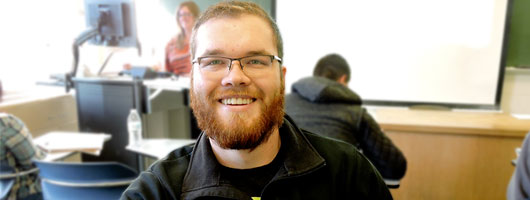 Pictured | James Dishman | Clinical Laboratory Science | Rochester, Indiana (hometown)
Pictured | James Dishman | Clinical Laboratory Science | Rochester, Indiana (hometown)
Bachelor of Science in Clinical Laboratory Science, MLT to CLS Completion
The Clinical Laboratory Science Medical Laboratory Technician (MLT) to Clinical Laboratory Science (CLS) completion track answers the needs of the trained MLT wishing to pursue a bachelors level degree important for career ladder advancement.
The track is open to students with a prior associates in MLT and/or certification as an MLT through the American Society for Clinical Pathology (ASCP) and has been nationally accredited through the National Accrediting Agency for Clinical Laboratory Sciences (NAACLS) for the completion of the bachelors level Medical Laboratory Science (MLS) certification through ASCP post graduation.
All other students should refer to the Bachelor of Science in Clinical Laboratory Science.
Clinical Laboratory Science Concentration Objectives
In order to fulfill the requirements of a Clinical Laboratory Science, MLT to CLS Completion Track, graduates will:
- Synthesize the fundamental biological sciences necessary for integration into clinical laboratory diagnostics
- Have entry-level professional knowledge in the most common areas of the clinical lab, including Hematology, Clinical Chemistry, Urinalyses, Clinical Microbiology, Immunology, and Blood banking
- Understand the professional, ethical, and practical responsibilities of laboratorians in the interdisciplinary health care team
- Be prepared to sit for the national certification exam offered through the ASCP BOC
Academic Advising
College policy on advising requires that students meet with their academic advisors at least once each year, and in some departments, prior to each semester enrollment. Students with a declared major are advised in their academic units. To determine who your advisor is and how to contact them, see One.IU.
Degree Requirements (63cr.)
Students receiving the Bachelor of Science in Clinical Laboratory Science, through the MLT to CLS completion track, must complete 63 credits including:
- Campuswide General Education Curriculum (18 cr.) to include
- Writing | ENG-W 131 Reading, Writing, and Inquiry I
- Oral Communication | SPCH-S 121 Public Speaking
- Quantitative Reasoning
- Computer Literacy
- Non-Western Cultures or Diversity in United States Society
- Common Core | 300–level course
- Science Requirements (26 cr.)
- Major Requirements (19 cr.)
- Major courses in the B.S. in CLS will begin with CLS-L 201 (also open to non-majors).
- Students are required to apply officially to the program upon completion of their prerequisite courses and the majority of their co-requisite courses.
- All courses are 3 credit hours, unless otherwise noted.
Science Requirements (26 cr.)
- BIOL-L 101 Introduction to Biological Sciences 1 (5 cr.)
- BIOL-L 102 Introduction to Biological Sciences 2 (5 cr.)
- BIOL-L 211 Molecular Biology
- BIOL-L 311 Genetics; OR
BIOL-L 321 Human Immunology; OR
Approved course - CHEM-C 105 Principles of Chemistry I
- CHEM-C 106 Principles of Chemistry II
- CHEM-C 125 Experimental Chemistry I (2 cr.)
- CHEM-C 126 Experimental Chemistry II (2 cr.)
Major Requirements (19 cr.)
- CLS-C 415 Clinical Molecular Diagnostics and Special Chemistry
- CLS-C 417 Advanced Hematology and Cancer
- CLS-E 406 Supplemental Externship (4 cr.); OR
Approved Credits (4 cr.) - CLS-I 417 Advanced Diagnostic Immunology, Transfusion and Autoimmune Disease
- CLS-M 250 Clinical Laboratory Management, Ethics and Policy
- CLS-M 413 Advanced Clinical Microbiology